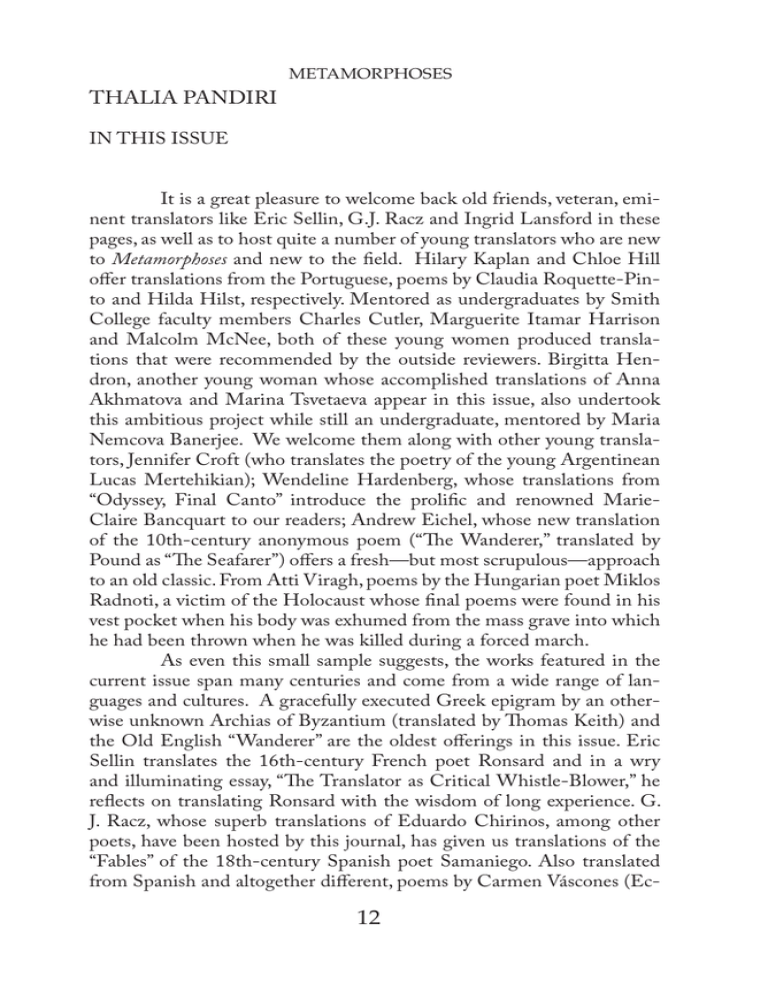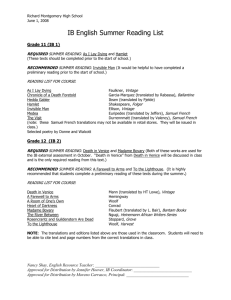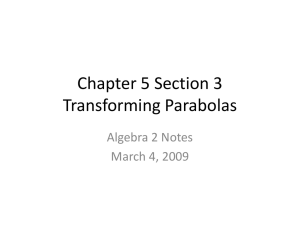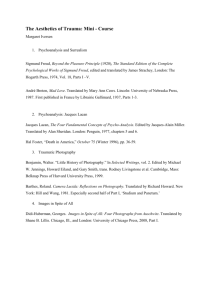THALIA PANDIRI
advertisement

THALIA PANDIRI METAMORPHOSES IN THIS ISSUE It is a great pleasure to welcome back old friends, veteran, eminent translators like Eric Sellin, G.J. Racz and Ingrid Lansford in these pages, as well as to host quite a number of young translators who are new to Metamorphoses and new to the field. Hilary Kaplan and Chloe Hill offer translations from the Portuguese, poems by Claudia Roquette-Pinto and Hilda Hilst, respectively. Mentored as undergraduates by Smith College faculty members Charles Cutler, Marguerite Itamar Harrison and Malcolm McNee, both of these young women produced translations that were recommended by the outside reviewers. Birgitta Hendron, another young woman whose accomplished translations of Anna Akhmatova and Marina Tsvetaeva appear in this issue, also undertook this ambitious project while still an undergraduate, mentored by Maria Nemcova Banerjee. We welcome them along with other young translators, Jennifer Croft (who translates the poetry of the young Argentinean Lucas Mertehikian); Wendeline Hardenberg, whose translations from “Odyssey, Final Canto” introduce the prolific and renowned MarieClaire Bancquart to our readers; Andrew Eichel, whose new translation of the 10th-century anonymous poem (“The Wanderer,” translated by Pound as “The Seafarer”) offers a fresh—but most scrupulous—approach to an old classic. From Atti Viragh, poems by the Hungarian poet Miklos Radnoti, a victim of the Holocaust whose final poems were found in his vest pocket when his body was exhumed from the mass grave into which he had been thrown when he was killed during a forced march. As even this small sample suggests, the works featured in the current issue span many centuries and come from a wide range of languages and cultures. A gracefully executed Greek epigram by an otherwise unknown Archias of Byzantium (translated by Thomas Keith) and the Old English “Wanderer” are the oldest offerings in this issue. Eric Sellin translates the 16th-century French poet Ronsard and in a wry and illuminating essay, “The Translator as Critical Whistle-Blower,” he reflects on translating Ronsard with the wisdom of long experience. G. J. Racz, whose superb translations of Eduardo Chirinos, among other poets, have been hosted by this journal, has given us translations of the “Fables” of the 18th-century Spanish poet Samaniego. Also translated from Spanish and altogether different, poems by Carmen Váscones (Ec- 12 Fall 2013 uador, 1958- ), translated by Alexis Levitin. The prize-winning team of Brazilian Adélia Prado and her American translator, poet Ellen Doré Watson, have graciously given us poems from a forthcoming book that we are very happy to include in this issue. Among the retranslations of old classics, in addition to the tenth-century Wanderer we include, from Russian, a fresh translation of a passage from Demon, by the romantic soldier, poet and novelist Lermontov, translated by a Georgian cardiologist, Teimuraz Chanturishvili. That a Georgian physician who loves poetry--both Georgian and Russian-devotes himself to translation seems at first remarkable, but is in fact not so surprising to those of us who live among translators. To be sure, many of the contributors to this journal are academics, or para-academics. But not all. The writer Slavko Zupcic is a Venezuelan psychiatrist who practices in Spain; his translator, Jeremy Osner, is a computer programmer who lives in New Jersey. Among our reviewers in this issue, John Burk (Turkish) is a retired Professor of Biological Sciences; Robert Kaplan (Spanish) is a computer consultant. It gives me, personally, great joy that a love of languages and literature brings us together independently of academic affiliations. Other poetry in these pages includes “Marsyas,” by the important contemporary Greek poet Pantelis Boukalas, beautifully translated by Richard Berengarten and Paschalis Nicolaou; “Exodus” by Turkish poet Orhan Veli, translated by George Messo; prose poetry by Pierre Chappuis, translated from the French by Tim Keane and Myriam Moraz; a deceptively simple but profound poem by the contemporary Neapolitan poet Erri De Lucca, translated by Alfonso Procaccini; a poem by the Georgian poet Dato Barbakadze, translated by Lyn Coffin with Nato Alhazishvili and three poems by the eminent Danish poet and performer Benny Andersen, whose musicality, imagination and wit come through in Michael Goodman’s translations. Also from Denmark comes Ib Michael’s surreal short story “Shadow Sharks,” translated by Ingrid Lansford, from whom we also have (translated from the German) Wolfdietrich Schnurre’s powerful short story, “The Return” (1945). Schnurre’s style has both the stark, spare quality and the scrupulous attention to detail I associate with the camera work of post-war neorealist cinema. His ear is perfectly attuned to the direct, often crude language of his characters speech and innermost thoughts. Through their own words, entering into their minds, we come to see how the stronger of the two men who have escaped and are trying to get home is both done in and saved by the humanity he resists. We are 13 METAMORPHOSES fortunate to have another of Efraín Bartolomé’s “Voices from Chiapas,” from the Ocosingo War Diary: this one belonging to Don Tonito, who comes alive for us through the authenticity of his narrative. In Bartolomé’s hands, the oral narratives, the “voices” of those who lived through the Chiapas rebellion, seem raw and unembellished but form an intricate and beautiful polyphonic oratorio. As in an earlier issue, the selection is translated by Kevin Brown. We also have a mock hagiography of sorts with an unexpected twist, “Saint Adorata” by Guillaume Apollinaire (translated from the French by Edward Gallagher); a Russian short story by Anatoliy Krym, translated by well-known Ukrainian translator Anatole Bilenko; two short stories, by Vu Trong Phung and Nguyen Cong Hoan, translated from the Vietnamese by Quan Manh Ha, and an excerpt from a novel by Nigerian author Akínwùmí Ìsòlá, translated from the Yorùbá by Pamela J. Olúbùnmi Smith, who was a contributor to the special Sub-Saharan African issue guest-edited by Katwiwa Mule. In addition to a bibliographical essay by Yvonne Freccero on contemporary literature from the Arab world, we have book reviews buy Valerie K. Orlando, C. John Burk, Robert Kaplan, Chris Tong, Hilary Keller and Vlasta Moman- Kováčová Kovacova, Thalia Pandiri, Ingrid Lansford. A QUICK PREVIEW OF FUTURE ISSUES FOR 2014, we are extremely fortunate to have a special double issue dedicated to contemporary Galego (Spanish Galician) poetry, guest edited by Professor Marta Dahlgren of the University of Vigo, Spain. The issue is accompanied by an audio CD of poetry read by two young poets, Fran Alonso and María Lado. FOR 2015, we have been considering contributions for a general issue, and we have already accepted some. We know we have poetry translated from Ukrainian, Korean, Japanese, French, Italian, and Greek; prose from Danish, German (from Austria and Germany), Vietnamese, Japanese, Spanish. A good many more submissions are out for double-blind peer review, and we welcome more. FOR 2016, a special double issue is under way, a critical anthology of contemporary Brazilian prose, including fiction by 15 contemporary authors from different regions in Brazil. Selections are accompanied by 14 Fall 2013 critical essays from scholars in the field of Brazilian Studies. The volume is guest-edited by Aileen El-Kadi, with Marguerite Itamar Harrison as consulting editor. As always, I would like to thank all of our contributors, as well as everyone who has granted permission to reprint original texts, and to publish translations. Particular thanks are due to the anonymous readers whose generosity, expertise, and thoroughness make this journal possible; to the contributing editors and members of the editorial board whose hard work and wise counsel are essential; to the interns without whose patience, enthusiasm, smarts and hard work we would not be able to function: Leah Jacobs, Rebecca Lee, and most especially Erica Zhang, who has shepherded the journal and the website with the utmost care and with unflagging graciousness for four years. We wish her joy and success in all her future undertakings, and we will miss her very much. 15






